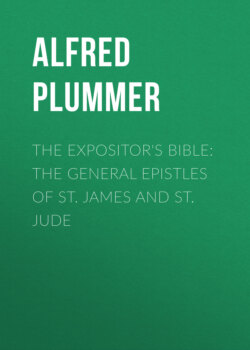Читать книгу The Expositor's Bible: The General Epistles of St. James and St. Jude - Alfred Plummer - Страница 7
На сайте Литреса книга снята с продажи.
Оглавление[8] The date so frequently given, A.D. 363, cannot be substantiated, and on the whole is not probable. See Hefele, History of the Church Councils, II. vi. 93.
[9] The Epistle to the Hebrews and the Apocalypse.
[10] γνωρίμων δ' οὖν ὅμως τοῖς πολλοῖς (H. E. III. xxv. 3), where γνώριμος, as usual, indicates familiar knowledge. Eusebius is a desultory writer, and one has to gather his views from statements scattered over chaps. iii., xxiv., and xxv., some of which are not very precise. The following table seems to represent his opinion:—
| Canonical Books (ἐνδιάθηκοι γραφαί) | Universally acknowledged (τὰ ὁμολογούμενα) | Four Gospels, Acts, fourteen Epistles of Paul (Hebrews ?), 1 John, 1 Peter, Apocalypse (?). |
| Disputed (τὰ ἀντιλεγόμενα) | As to authenticity—2 Peter. | |
| As to Apostolicity—James, Jude, 2 and 3 John. | ||
| Uncanonical | Orthodox, but of no authority, because defective | As to authenticity—Acts of Paul, Shepherd, Apocalypse of Peter. |
| As to Apostolicity—Epistle of Barnabas, Doctrines of the Apostles, Gospel according to Hebrews, Apocalypse (?). | ||
| Heretical | Gospels of Peter, Thomas, Matthias, Acts of Andrew, John, etc., etc. | |
[11] Epist. Fest. xxxix. The passage is given in full by Westcott On the Canon, Appendix D., xiv. The Ecclesiastical History of Eusebius cannot have been completed later than A.D. 325, but the earlier books were probably written about A.D. 313, soon after the Edict of Milan. See Bishop Lightfoot, Dict. of Chris. Biog., I., p. 322.
[12] Harnack, Das Neue Testament um das Jahr 200 (Freiburg I. B., 1889), p. 79.
[13]
| Compare Clement | with James. |
| x. 1 | ii. 23. |
| xi. 2 | i. 8; iv. 8. |
| xii. 1 | ii. 25. |
| xvii. 6 | iv. 14. |
| xxx. 2 | iv. 6. |
| xxxi. 2 | ii. 21. |
| xlvi. 5 | iv. 1. |
| xlix. 5 | x. 20. |
[14] Salmon, Introduction to the N.T., pp. 52, 582–91, 4th Ed. (Murray, 1889); Zahn, Geschichte des Neutestamentlichen Kanons (Erlangen, 1889), p. 962.
[15] If Zahn is right in thinking that Clement knew, and perhaps commented on, the Epistle of James, it may have become known in Alexandria somewhat earlier. A few passages in Clement have possible reminiscences of James; e.g. in Strom. II. v. he says of Abraham that he is found to have been expressly called the "friend" of God (James ii. 23); and in Strom. VI. xviii., in connexion with loving one's neighbour (the βασιλικὸς νόμος of James ii. 8), he speaks of being βασιλικοί (Zahn, Geschichte des Neutestamentlichen Kanons, I., pp. 322, 323—Erlangen, 1888). The Hypotyposeis, in which Clement perhaps treated of the Catholic Epistles, were written after he left Alexandria (Ibid., p. 29).
[16] Or, more literally, "a right strawy Epistle"—"eine rechte strohern Epistel. … Denn sie doch keine evangelische Art an sich hat" (Luther's Werke, ed. Gustav Pfizer, Frankfurt, 1840, p. 1412; see also pp. 1423, 1424, and Westcott On the Canon, 3rd ed., pp. 448–54).
